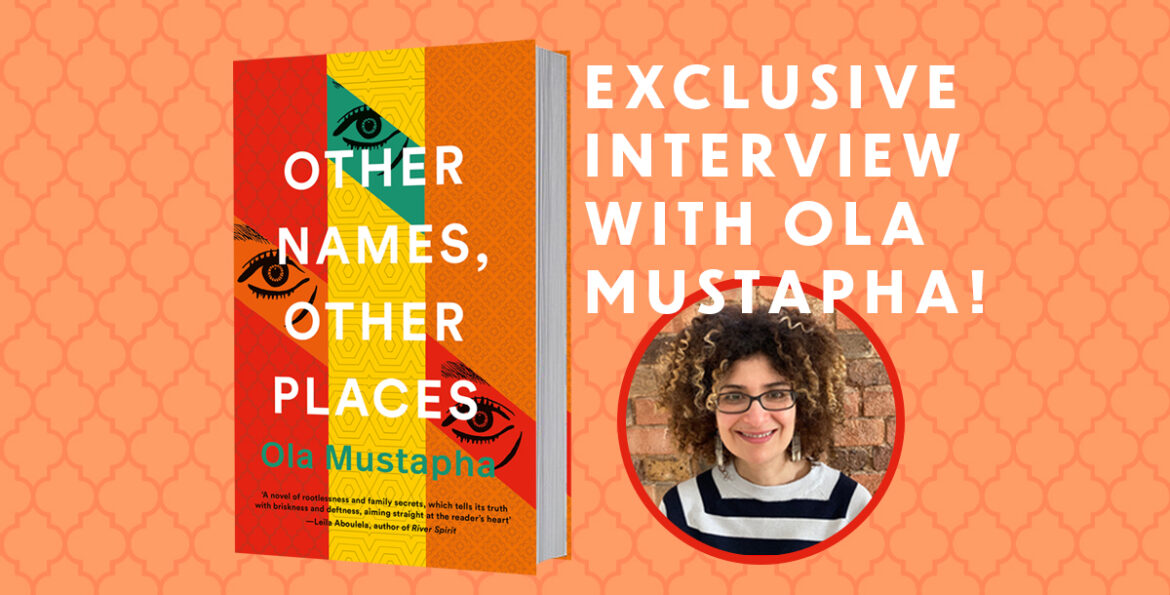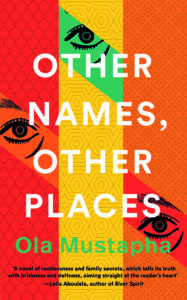

Ola Mustapha: Interview
- 13th July 2023
- Category : Author,Interviews & Blogs
Ola Mustapha was born in London and spent part of her childhood living in Egypt, before returning to England. She studied economics and Japanese at university and then moved to Japan, where she taught English for several years. She now lives in London and works as an editor. Her short fiction has been published in literary journals including Aesthetica, Storgy and Bandit Fiction.
The concept of ‘fitting in’ and being caught between cultures is a key theme in Other Names, Other Places. How did you approach writing this theme?
I think the concept of ‘fitting in’ and struggling to belong is a universal one. However, people who straddle different, sometimes conflicting, cultures obviously face an added layer of complexity. In writing about this theme, I was interested in how it overlaps with the need for honesty – I would think that for most people, living a life built on secrets and lies is a burden, not a source of pleasure. It certainly is for Nessie, the main protagonist in Other Names, Other Places. I wanted her struggle towards maturity to involve the realisation that she is not the only one facing this predicament – and that the people who were pivotal in her early life had much more to lose than she did if they were to drop their masks.
Nessie has three names – each used by different people in her life. How does this relate to her struggle to find her own identity and patterns of self-sabotage?
Nessie’s names represent the different versions of herself: one (Susu) is used only by family, one (Nesrine, her full name) is used by hardly anyone, and one (Nessie) is used at school, at work, in the outside world. This anglicised version of herself is a symbol of the normality she craves – Nessie thinks she wants to be just like everyone else: no better, no worse, and most of all, no different. But each time she gets close to this vision of ‘normality’, she does something to ruin it. So in a sense, even the ‘Nessie’ version of herself doesn’t really belong to her. She is struggling to find something that may not be wholly encapsulated by any of those names.
Nessie moves to Japan, her mother returns to Tunisia and her sister leaves home. What is the significance of the theme of relocation in Other Names, Other Places, and how does this relocation help the three women to establish their identities?
Each woman’s move crystallises a particular facet of her character. Nessie’s relocation to Japan is largely a cowardly step – she does it to escape her oppressive family set-up without having to deal with too much confrontation. This is in stark contrast to Sherine, her older sister, who has to muster all her strength and determination to leave home – even though she’s only moving to the other side of London, this causes a huge conflict because of the family’s expectation that the daughters will live at home until they get married. Bouthaina, Nessie’s mother, finally takes control of her own life by returning to Tunisia, but she seems unable to fully enjoy her newfound freedom – she is too engrained in the habit of being ‘part of the staff, not the management’, as Nessie observes.
In Nessie’s defence, even though her own motives for moving to the other side of the world are not particularly noble, she is forced to gain some empathy for the struggles her parents went through as immigrants to London (albeit Nessie is in a much more privileged position as an English-speaking ‘expat’ in Japan). Also, once she’s thousands of miles away from her family, she has no choice but to confront the fact that she is the architect of most of her problems.

You grew up and currently live in London. Did your experiences in London influence your writing of Nessie’s childhood and adolescence in this setting?
One of my biggest pleasures in writing this book was the chance to revisit my memories of growing up in London in that era – what we ate, wore, and watched on TV. On the deeper issues, one of my most vivid recollections, which I drew on in the novel, was the invasion of Kuwait by Iraq in 1990, and the ensuing war on Iraq by the western allies. This was a kind of awakening for me. To paraphrase Nessie’s words, I had always had a vague sense that – if the media and popular culture were to be believed – it wasn’t a ‘good thing’ to originate from that part of the world. The first Iraq war led to some commentators expressing fairly dehumanising narratives, which in a way was a relief: the open hostility was honest, at least.
Other Names, Other Places is your debut novel. What drew you to writing it, and did you find the writing process challenging?
Other Names, Other Places was actually the second novel I wrote. My first was an attempt at speculative fiction set in a dystopian society that I revised repeatedly but never managed to make gel. Lurking within this was an exploration of identity and belonging, and someone who read the first manuscript suggested writing about these themes in a realistic setting. The initial drafts had some major problems with clarity – I was lucky enough to have a manuscript assessment from someone who pointed this out and encouraged me to stick to a more linear timeframe.
Other Names, Other Places contains several elements of diasporic writing. In what ways does ‘nostalgia’ affect the characters, and how important is the theme of ‘homeland’ in their lives?
Nostalgia is one of the most powerful forces affecting the characters. When Nessie moves to Japan, she is plagued by a sense of nostalgia for Japan itself, even though she’s still living there – a sense of a life constantly slipping away from her. Likewise, her parents are yearning for other lives somewhere other than England. Part of the trajectory for Nessie and other characters is their realisation that, to use a cliché, ‘home’ is more a state of mind than an actual place.
What is your favourite local bookshop?
Kirkdale Bookshop in Sydenham, southeast London.
Other Names, Other Places is out now. Order now from Blackwell’s and Waterstones.
To find out more about Ola visit her author page.














